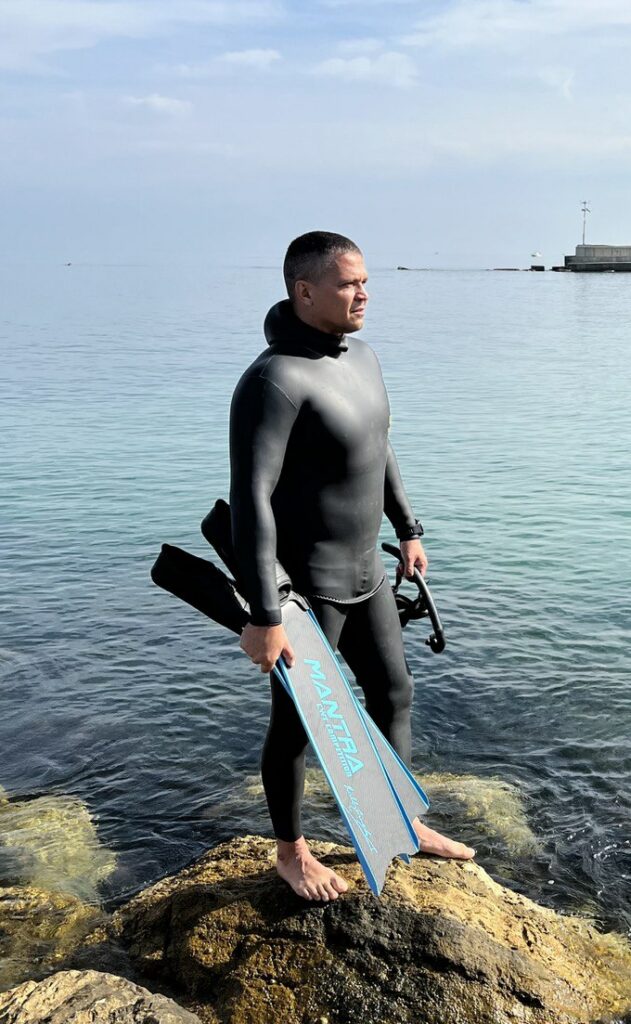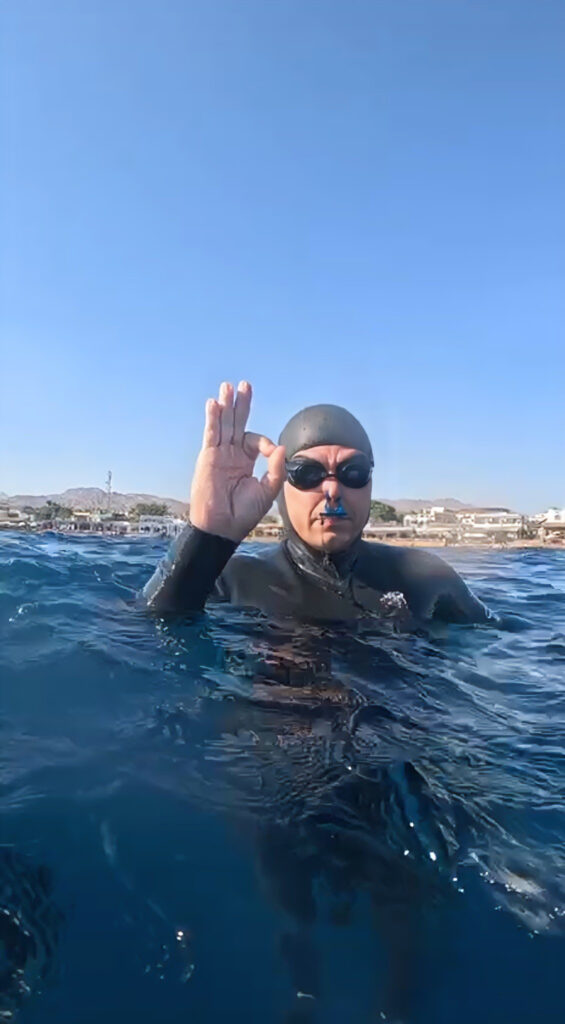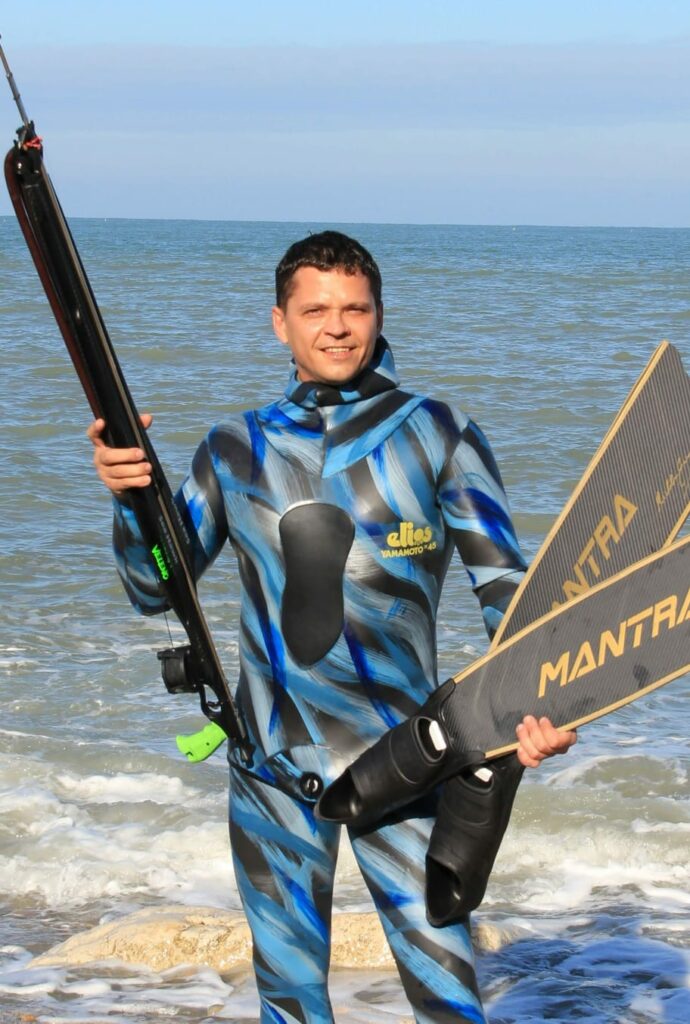
Hi!
I’m excited to share my freediving course offering with you!
Who I am and what I can offer you
My name is Sergey Goncharov I am a certified instructor in three of the most prestigious associations
AIDA International
Molchanovs
F.I.P.S.A.S.
I have had the honor of training under some of the best instructors in the world, which has allowed me to achieve meaningful personal goals…:
71.5 meters of depth in one breath (FIM category).
118 meters in the pool in fins.
My strength is the unique experience gained from three leading freediving schools: American, Italian and Russian. By combining their best techniques, I have developed a personalized approach to training. Thanks to my certificates and insurance, I guarantee not only quality training, but also safety….
Courses I offer
If you want to discover the world of freediving, I have prepared three courses in the pool:
AIDA 1 – Introduction to Freediving
AIDA 2 – Freediving for Beginners
AIDA 3 – Advanced Freediving.
Why choose these courses?
The first thing is that they are suitable for everyone. You can start training at any age if there are no medical contraindications.
The second thing is the international level certification. Upon completion of the courses, you will receive a recognized certificate that will give you the opportunity to dive in the deepest pools of the world without an instructor.
The third point is a unique experience. Our courses provide the in-depth knowledge and practical skills you need to freedive safely and effectively. You will learn proper breathing techniques, including methods to significantly increase your breath-hold time. Master effective dive techniques that will maximize energy conservation and minimize stress at depth. We also focus on safety, teaching proper self-control, rescue and first aid techniques. All of this, combined with a personalized approach and fun, hands-on training, will make your experience unique and as effective as possible.

Details and cost
Here is an overview of the courses:
The AIDA 1 (Introduction to Freediving) course is an entry level freediving training course designed for absolute beginners who are just starting their introduction to the sport. This course focuses on basic knowledge, skills and safety, helping participants to understand the basic principles of freediving.
The AIDA 2 (Freediver) course is a basic course for beginning freedivers who want a complete introduction to the world of freediving. It is suitable for those who are already familiar with the water and are ready to learn more in-depth theoretical and practical aspects of breath-holding, diving and safety.
The AIDA 3 (Advanced Freediver) course is an intermediate level in the AIDA training system, designed for freedivers who already have basic skills (AIDA 2) and want to improve their performance, deepen their knowledge of freediving theory and techniques, and improve safety.
AIDA 1
2 pool visits
1 dry workout
Main content of the AIDA 1 course:
Theoretical part:
Introduction to freediving: what it is and why you need it.
Fundamentals of breathing and breath holding.
Overview of freediving equipment.
The importance of relaxation and breath control.
Principles of safety when diving.
Practical part:
Techniques of relaxation and preparation for breath holding.
Primary practice of static breath-holding (STA).
The basics of dynamic swimming (DYN) – scuba diving in fins.
First dives at shallow depths (pool or open water).
Basic pressure compensation skills (simple ear flattening techniques).
AIDA Certificate 1:
To successfully complete the course and receive certification, the participant must:
Static breath-holding (STA): demonstrate breath-holding for a minimum of 1 minute 30 seconds.
Dynamic apnea (DYN): swim a minimum of 25 meters underwater.
Open Water Diving (if conducted): reach a depth of 5-10 meters.
Technique: master basic pressure compensation skills.
Safety: demonstrate basic safety protocols such as escorting a partner and providing surface assistance
Outcome:
After successfully completing AIDA 1, you will have the basic knowledge and skills to feel confident in the water and begin your exciting journey into the world of freediving.
One week
€180
AIDA 2
4 trips to the pool
2 dry training sessions
The main content of the AIDA 2 course:
Theoretical part:
Physiology of breath-holding: what happens in the body during apnea.
Basics of pressure equalization: the Frenzel technique and other compensation methods.
The concept of residual lung volume and the body’s adaptation to depth.
Safety and rescue basics: how to prevent and respond to potential risks.
Training planning: how to improve performance while avoiding overexertion.
Practical part:
Static apnea (STA): improving breath-holding on the surface of the water.
Dynamic apnea (DYN/DNF): diving techniques with and without fins.
Constant Weight Training (CWT): first deep dives with fins in open water.
Rescue skills: assisting a partner on the surface and at depth.
Improved swimming and flipper technique.
Standards for AIDA 2 certification:
To successfully complete the course, the participant must demonstrate the following:
Static breath-holding (STA): minimum of 2 minutes.
Dynamic apnea (DYN): swim a minimum of 40 meters underwater (in fins).
Constant Weight Training (CWT): reach a minimum depth of 16 meters in open water.
Safety skills: demonstrate confident partner escort and rescue from a depth of 10 meters.
Theory: successfully complete a written test covering the course material.
Outcome:
By completing the AIDA 2 course, you will learn how to safely and confidently hold your breath, dive to depths of up to 20 meters and communicate effectively with your partner. This course will open the way to new underwater achievements and prepare you for deeper dives.
Two weeks
€350/€400
AIDA 3
4 visits to the pool
2 dry training sessions
Main content of the AIDA 3 course:
Theoretical part:
Physiology of breathing and body adaptation to breath-holding.
Basics of barotrauma and pressure compensation techniques.
Depth adaptations including “more lung capacity” and “lung packing” techniques.
Safety and rescue protocols.
Principles of freediving training.
Pool and open water practice:
Improving static breath-holding (STA).
Dynamic apnea training (DYN/DNF).
Depth work in open water conditions.
Advanced pressure compensation practice (Frenzel and other techniques).
AIDA 3 certification requirements:
To successfully complete the course and receive certification, the freediver must demonstrate the following:
Static breath-holding (STA): minimum of 2 minutes and 45 seconds.
Dynamic apnea (DYN): swim a minimum of 55 meters underwater (in fins).
Constant Weight Training (CWT): reach a depth of at least 24 meters (with fins).
Rescue: demonstrate confident execution of a rescue protocol from a depth of 10 meters.
Technique: mastery of correct diving technique, including the performance of pressure compensation.
Theoretical Examination: successful completion of a written test on the course material.
Bottom line:
The AIDA 3 course is considered one of the most significant stages of training, because after its completion freedivers can train at greater depths (up to 30-40 meters) and begin to consider freediving as a discipline for serious training.
Two weeks
€350/€400
A course is more fun and effective when shared! Ideal for a group of at least 4 students, so you can learn not only how to dive, but also how to ensure the safety of your partner.
Here is a taste of the skills you will acquire in each course:

Apnea is much more than a sport: it is a journey of self-discovery. During the courses you will learn to control your body, improve your concentration and overcome your limits, both physically and mentally.
If you have any questions or would like to sign up, write to me! I look forward to accompanying you on this extraordinary adventure!